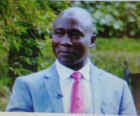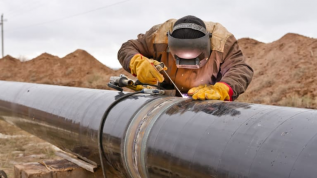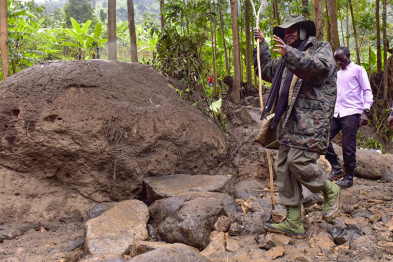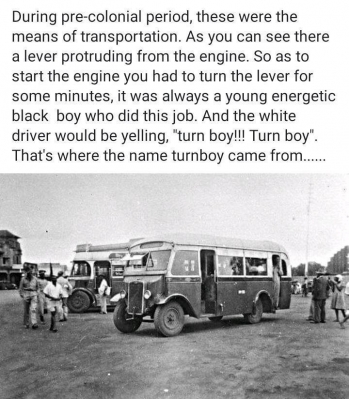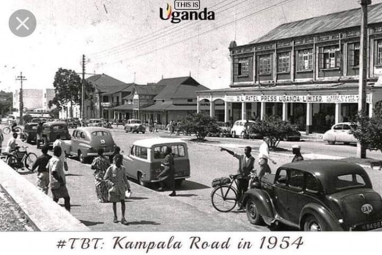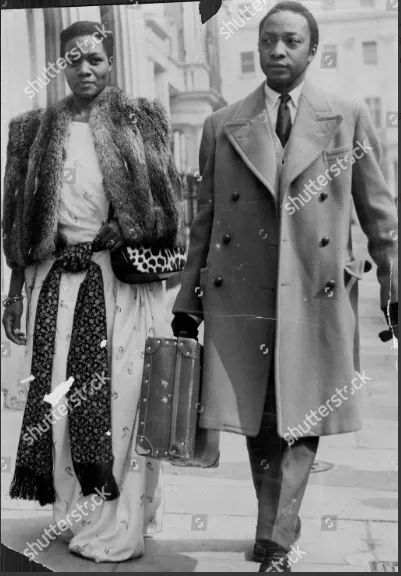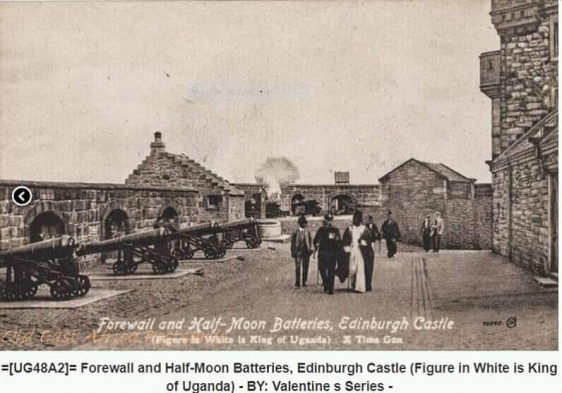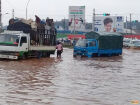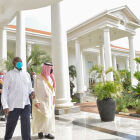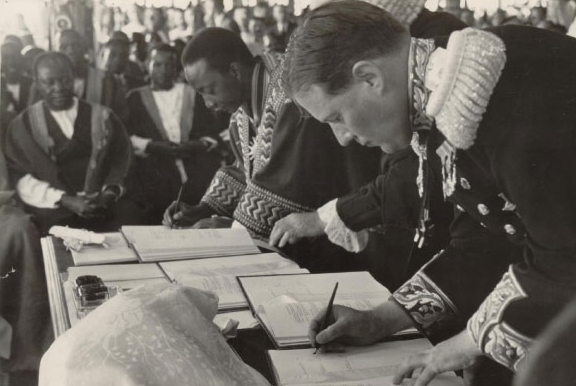As Uganda edges closer to the 2026 general elections, the political temperature is already rising—and for the opposition National Unity Platform (NUP), the pressure is anything but subtle.
A wave of abductions, detentions and alleged torture of party supporters has intensified in recent months, casting a long shadow over the democratic process. But for David Lewis Rubongoya, NUP’s secretary general, the state crackdown is not a deterrent—it’s a rallying cry.
In an exclusive interview with MUHAMMAD KAKEMBO, the secretary general paints a stark picture of what he calls “systematic political persecution,” but remains defiant in the face of growing intimidation.
From vanished activists to plans for a mobile app to track arrests in real time, the party is adapting to repression with technology, organization and resilience.
“We will not be bullied out of the democratic space,” Rubongoya says. “Anybody who doesn’t vote has no right to complain about bad governance.”
With over 100 supporters currently behind bars and thousands previously abducted, NUP’s fight for political space has become not just a matter of survival—but a test of Uganda’s democratic future.
We are seeing a ramp-up in arrests of NUP supporters. How many have so far been detained?
As of today, five of our members are completely unaccounted for. The arrests have been steadily increasing, but it’s difficult to provide an exact number because detentions are happening daily in various parts of the country.
Between 2019 and 2021, we documented 2,134 abductions of our supporters. Of those, 18 individuals are still missing to date. More recently, five individuals were abducted—including Eddie Mutwe, Shakul Ssentongo, Kyagulanyi Najib, Ssebudde Kassim, and Mpalanyi Michael.
Currently, we have over 100 supporters on remand, most of them facing what we believe are trumped-up charges. However, tracking every single case is challenging due to the frequency and geographical spread of the incidents.
To address this, we are in the process of developing a mobile application that will allow us to document these arrests more systematically. It will also enable citizens to report abductions or arrests in real time.
This is necessary because, in many cases, we only learn about incidents days after they’ve happened. The crackdown is meant to instill fear, but we are choosing to respond with organization, technology and resilience. NUP remains committed to participating in the democratic process despite the threats and emphasizes the importance of citizens turning up to vote in 2026 as a collective stand against repression.
It looks like the majority of those abducted are eventually released. Under what circumstances does that happen?
Most of them are simply dumped. You saw what happened to Chairman Nyanzi. Previously, in many cases, they would be taken to CMI [Chieftaincy of Military Intelligence], tortured, then eventually dumped at the Special Investigations Unit in Kireka.
There, they would be released on bond. But since the Masereka incident—after he came out with photos showing clear signs of torture—they’ve changed their approach. Now, they just abduct, torture and dump without following any legal process. In other instances, they abduct, torture, and then take the person straight to prison.
Lately, they’re fond of slapping charges of aggravated robbery. If you’re a TikToker or social media activist, they’ll often take you to Entebbe Magistrate’s court, and from there, you’re remanded. Some detainees are pressured to apologize and promise to stop supporting NUP.
In a few cases, people are “forgiven” and released. But it’s all arbitrary. There’s no process, no rule of law guiding these actions.
When they’re released, do they ever return to the party?
Yes, they do. Most of the time, whatever they may have said while in custody was just to end the torture. The first place many of them return to is NUP, because they know why they were targeted in the first place.
Their commitment doesn’t change—it’s the system that breaks them temporarily.
We’re already in the electoral season. How are these arrests affecting the party’s preparedness for 2026?
In every possible way. As secretary general, my focus should be on building party structures, identifying candidates, and coordinating consultations across the country. But instead, I’m constantly dealing with abductions, disappearances and court cases.
The same applies to our president and other party leaders. Also, many of those being arrested play crucial roles in our organization. Eddie Mutwe, for example, is the head of security for our president.
Achileo Kivumbi is in charge of security here at our headquarters. Their absence creates gaps in operations, weakens our systems, and drains morale. It has a psychological toll, too. When people saw the image of Eddie Mutwe released by Chief of Defence Forces Gen Muhoozi Kainerugaba, it shook them. Many supporters don’t remain the same after that.
The arrests are not just physical—they’re designed to instill fear and paralyze our efforts from within.
Similar arrests happened in the lead-up to the 2021 election, but this time, they seem to be happening much earlier. Doesn’t that raise questions about the nature of the elections you’re preparing to contest?
Exactly. You should ask yourself: why are they doing this? It’s because they know they have no chance in a free and fair election. That’s why they’re resorting to arrests, intimidation, and repression— to scare people, to breed apathy.
When Muhoozi tweets, “What can you do?”—he’s not just taunting us. He’s trying to make people give up and say, “Let these thugs rule.” That’s why they can surround our party headquarters with no consequence.
Our response has been to educate the people about the power of protest votes—to overwhelm these thugs at the ballot box. In Kawempe, even with heavy deployment, I visited polling stations where people pushed back.
When the military ordered voters to leave, they would step away but return. At one point, they tried to arrest our polling agents but failed because the people stood firm.
How do you plan to rally people to overcome such a system?
Fighting a dictatorship is not easy. If anyone tells you it is, they’re lying to themselves and to everyone else. It’s extremely difficult—but it must be done. This time, we are focusing on telling citizens that this is their struggle.
Our biggest task is mobilizing the people and helping them realize that it’s up to them to free this country. Overthrowing a dictatorship doesn’t require a majority— just a critical mass. Even if it’s one percent of the population, if they’re committed, it’s enough to bring about change.
Do you believe things are moving in that direction?
Yes, I saw it in Kawempe. I’ve also seen it in many of our grassroots activities. Ironically, the regime itself is helping catalyze this movement. Just look at what Muhoozi is doing—people now realize they could be the next Eddie Mutwe.
We can only hope that when these criminals are finally going down, they don’t take the whole country with them. Not so many people share your optimism.
What makes you so confident?
For me, I’m optimistic because I’ve studied how dictatorships fall. I know that dictators rise—and then they fall. They don’t rise endlessly. In Uganda, there are clear signs that this regime is on a downward trajectory. You cannot do the things they are doing and still claim to be strong. All their actions are driven by fear, and that’s visible for everyone to see.
You mentioned the concept of a “protest vote.” What exactly do you mean by that—especially when others argue that participating in elections is pointless?
We’re simply saying: let’s turn out and protest at the ballot box. One of the things Museveni has succeeded in doing is discouraging people from voting. In places like Kawempe, even when you combine all the polling stations— including those disrupted by the military—you barely reach a 25 percent voter turnout.
Why? Because of fear, apathy, and a sense of hopelessness. The idea behind the protest vote is to challenge that. We are telling people: come out and vote. Use your vote as a form of protest. That’s the message.
Some might say this isn’t different from previous election messaging. What makes you think the outcome will be different this time?
Our president has said it clearly: this dictator now operates from a well- known script. On election day, he arrests the main candidate, detains the campaign team, and packs the Electoral Commission with loyalists.
So, the real change must come from the people of Uganda. We’re saying it’s time to get out of our comfort zones. Too many people offer convenient excuses for not voting. You hear things like, “Voting doesn’t change anything.”
But I believe we need to start by understanding what the problem is. We know that Museveni and his son are the problem. Let’s first remove that obstacle—then, as a country, we can sit down and decide our future together.
You said voter apathy is growing with each election. Doesn’t that lend weight to the argument that elections are pointless under this regime?
Maybe those who argue for a boycott have a different worldview. But for us, the moment you refuse to participate, you’re giving Museveni and his son exactly what they want. They’re already trying to find ways to block us from contesting.
So, when you say you’re boycotting, you’re just handing them power on a silver platter. That’s their goal—to run unopposed.
But what difference does it make if they still retain power after the elections?
When you participate, you have a reason—and a platform—to fight back. Take the 2021 election. It was violent, yes, but it didn’t leave Museveni stronger. He had long portrayed himself as a democrat, but that image collapsed before the world.
If you don’t participate, you lose the moral and political ground to complain. You can’t speak out about bad governance, high commodity prices, or MPs receiving Shs 100 million if you didn’t even cast your vote. That’s been our consistent message to the people. You’ve announced a new Election Management Committee (EMC).
In the previous cycle, some members were accused of taking bribes to allocate party tickets. How did you select the current members?
These are people from our society, and as you know, society has both honest and corrupt individuals. We hope the ones we’ve selected are not corrupt. We’ve appealed to them directly—do not accept bribes.
That said, in the last election cycle, the bigger problem was that while many claims were made, no one came forward with concrete evidence. We kept asking for proof so that we could take action, but nobody provided any.
It’s difficult to act when no formal complaints are filed.
But the absence of evidence or the unwillingness to submit it doesn’t mean corruption didn’t happen. Isn’t that something the party should proactively investigate?
I agree—but what proof do I have that someone was awarded a ticket because of a bribe if no one is willing to speak up? We’ve been clear: report it, and we’ll investigate. But how can we begin an investigation when no one is coming forward with a complaint?
Still, shouldn’t a political party like yours aim to be above suspicion— and act on allegations even without formal prompting?
Is it really too much to ask that people submit a report? Just come forward. If you were asked for money in exchange for a ticket, let us know, and we’ll take it from there. Also, let me emphasize that we’ve put several checks and balances in place this time to prevent such issues.
For example, the team that goes into the field to gather data on candidates is monitored by another team. The EMC itself is also supervised by an Executive Board above them. So, their decisions aren’t final. That’s why I say—don’t just whisper about corruption. If you have evidence, bring it.
How is this EMC expected to make impartial decisions if it’s supposed to vet senior party figures, including the president and secretary general?
The key is to be guided by principles and values. That’s what we try to uphold every single day. No one is above the process.
We’ve seen senior party members declare certain parliamentary seats vacant because they have issues with the incumbents. Doesn’t this undermine the work of the EMC?
Let’s be clear about who we’re talking about—people like Twaha Kagabo and Jimmy Lwanga, who have publicly declared support for Muhoozi. Or Kazibwe Bashir and Mathias Mpuuga. Should we pretend everything is fine?
Let’s not forget that the party’s deputy president, Muwanga Kivumbi, said they were given one month to clarify their position. So, if anyone claims there was no due process, that’s not accurate. Politics is about perception and actions.
We judge people by what they do. If you’re Abed Bwanika and the party agrees on a direction—but you spend 95 per cent of your airtime attacking NUP and only five per cent criticizing Museveni—shouldn’t we ask questions? Shouldn’t we be concerned about where your allegiance lies?
Does being labeled a renegade make someone less of a party member?
That’s exactly why the party has left a window open—for anyone in question to come forward and clarify their position.
But doesn’t that compromise the independence of the Election Management Committee (EMC), especially if party leaders have already indicated that certain individuals shouldn’t represent the party?
Not at all. The EMC operates based on clear guidelines, and not even I, as secretary general, can alter those. These guidelines are developed by the National Executive Committee (NEC) and passed on to the Executive Board and other party structures for implementation.
Before any decision is made, the EMC must follow these criteria. And if I, for instance, don’t meet the requirements set out in the guidelines, I too would be disqualified. This is a political party—no one should expect that we won’t respond to individuals who actively campaign against us while still carrying our party card.
Take the case of someone involved in a corruption scandal, or an example like Joyce Bagala. The party deployed her, then reassigned her, and she refused. If others think we shouldn’t act in such cases, then they misunderstand how serious we are about discipline and integrity.
Some people say NUP appears intolerant of dissenting voices. What do you say to that?
Let’s not forget—this party has appointed people to significant positions even after they publicly criticized it or its leaders. Abed Bwanika, for instance, was appointed to head a parliamentary committee, even when he had already started expressing views critical of the party.
But some of the same people you’re now criticizing were once unknown to the public until you endorsed them. Doesn’t the party owe the public an apology for promoting individuals who now seem to have betrayed its mission?
We don’t believe we were wrong about them—the people made that choice. Our overriding principle is “people power.” It’s the people who decide who their representative should be.
In Kawempe South, for example, Kazibwe Bashir was among the best-performing MPs according to public sentiment at the time. When we conducted our internal assessment, we found he had strong grassroots support.
Perhaps he projected a different image during the campaign, but the process favored him. He wasn’t chosen behind closed doors— we let the people decide. In fact, he was running against Roy Ssembogga, who was a close friend of ours. But the process pointed to someone else, and we respected it.
mmkakembo@gmail.com
NB
Trouble is these ardent election opposition members who love elections have no other better paying employment to fall on. Politics is a business they have discovered that it has so much income to fall on than any other employment in this poor African country. Even if national elections are costantly stolen, and they are rigged, violent and biased and not free and fair they continue to hand state power on a silver platter to this brutal and miserable regime for many years and counting. That is what has been happening all the time with the NRM when it was chasing away the corrupt dictatorship of Amin and Obote. NRM came out of the brutal bush very poor in torn out green gum boots. These small time African bushmen toting with AK47 on their shoulders, were chasing the Ganda tribes people from their habitats with grenades and bombs to take shelter in their abandoned homes and steal their peasantry food stores. It was not about liberation and upholding Pan African human rights on the continent of African and the international stage! It was to get into African politics as a lucrative trade and employment(mercenary) until Jesus comes back to earth! The Uganda weak opposition, as fake opposers, are there for their piece of the cake as they contiuously blame anybody around them for their transgressions.
For the ancient and famous Kingdom state of Buganda to continue to participate in such misdemeanour does so at its own peril. For age’s past the Kingdom state of Buganda has had its humane civilization and a positive approach to governance, right in the centre of the deep continent of Africa. One wonders why it is being victimised so easily in present day generations!
It is all about peaciful discussions, gentlemans’ agreements and democratic civilization and not being cowards and loosers who probably fear to go back to the Ganda tribes people’s forests and bush, to kill innocent citizens for another six years. We are not those violent and military NRM brave heroes with guns on their firm shoulders, who refuse to resign from governing their people when they loose their dodgy national democratic elections. It is alright and brave enough for this Opposition NUP Secretary General to unite all the people of Uganda politically. It is wrong and all lies to continue to convince or force the suffering mandate to join him a second time in a national election he knows his party can never win(protest vote)! In every national election 40 years now the Uganda mandate has always voted a PROTEST VOTE against NRM governance. President M7 then warned the mandate of this country that akapapula tekanzija mubufuzi bwa Uganda. Dr Kizza Besigye and his FDC tried several times to compete NRM out of state power without any success. The opposition have requested for election reforms through NRM majority parliament without any success. Since July 2005 when several political parties were allowed into competitive African politics in Uganda NRM has refused any electoral defeat. What Parliament does is to provide a budget of 4 trillion Uganda shillings of tax payers money to whoever joins NRM to participate in fake democratic national elections to compete with this long serving government. Unfortunately such lots of tax payers money is very attractive to political bandits out there who are determined to make good money for themselves. Most Uganda politicians these days are millionaire guys who are certainly brave chaps. They are not loosers and cowards.
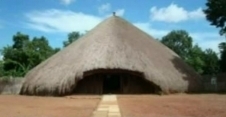
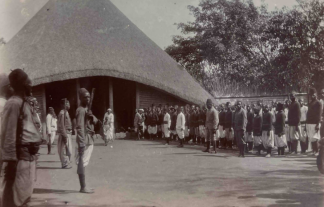


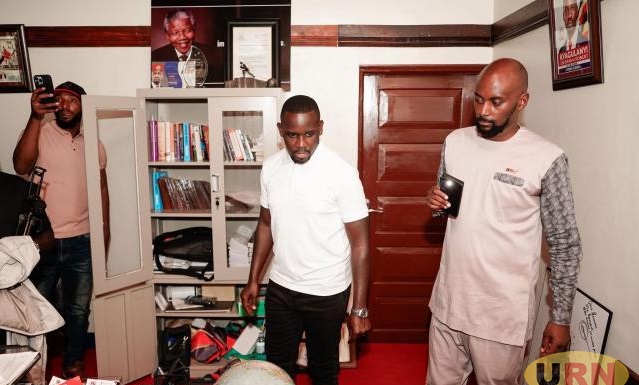
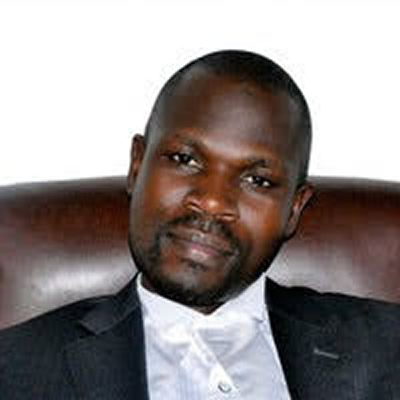 Luyimbazi Elias Nalukoola
Luyimbazi Elias Nalukoola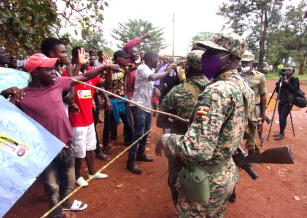
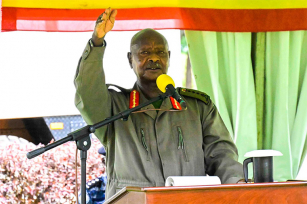
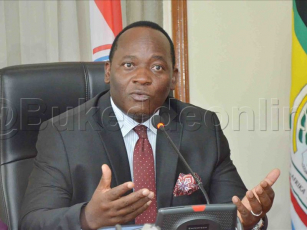
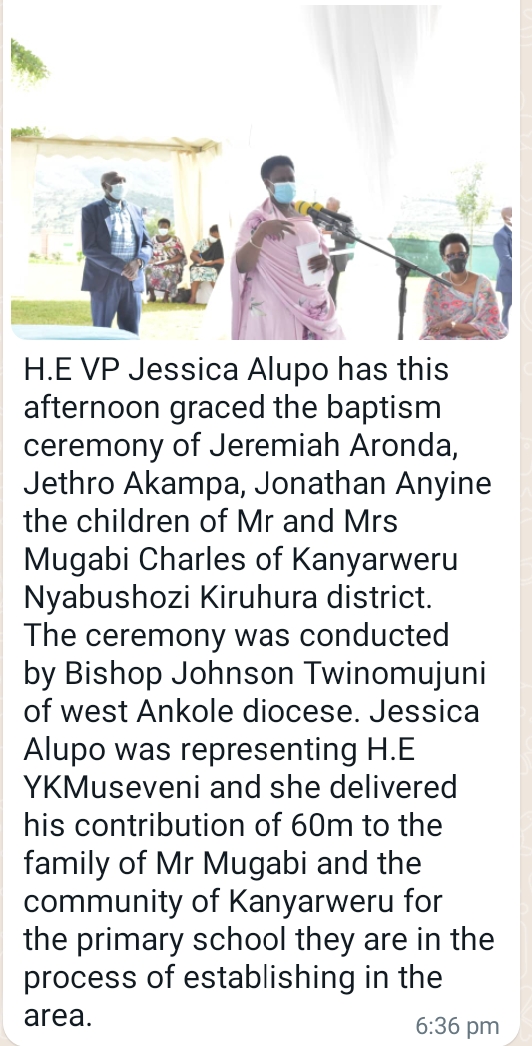
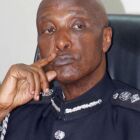
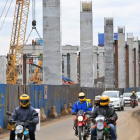
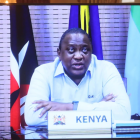

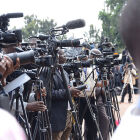
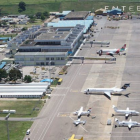
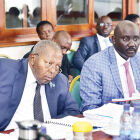
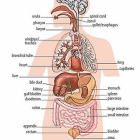
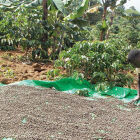

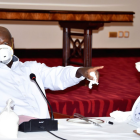
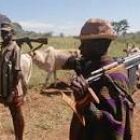
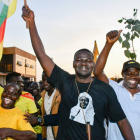
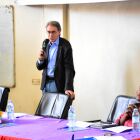

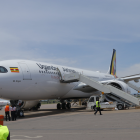
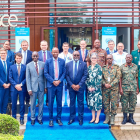
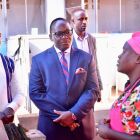
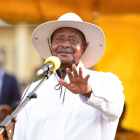
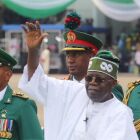
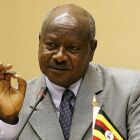
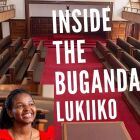
 The current minister of finance, Mr Matia Kasaija
The current minister of finance, Mr Matia Kasaija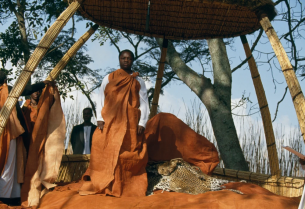 The Kabaka of Buganda Ronald Muwenda Mutebi II of Buganda stands under a shelter during his enthronement ceremony in 1993
The Kabaka of Buganda Ronald Muwenda Mutebi II of Buganda stands under a shelter during his enthronement ceremony in 1993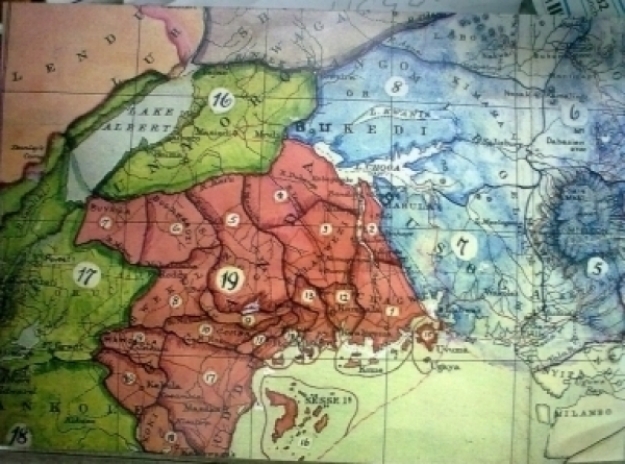 One of the Acient geographical maps of the State Kingdom of Buganda around the year 1910
One of the Acient geographical maps of the State Kingdom of Buganda around the year 1910








